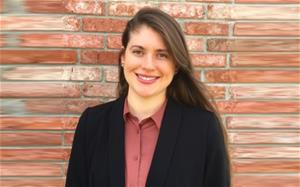
Sep 17, 2020 2020-09 Business Administration Faculty Research in Education
How finding your purpose could help you lose your stress
As the nature of work shifts rapidly, people struggle to find their daily career pursuits meaningful and purposeful. How can people persevere in challenging work settings and better cope with daily stressors? Sarah Ward is passionate about helping people experience more meaningful work and lower stress.

At the University of Missouri, where she completed both a master’s and PhD insocial/personality psychology, Ward became interested in understanding how people can find meaning in their work. Stress is often believed to impede on meaningful work, leading people to feel overwhelmed. Ward suspected that finding life itself meaningful might facilitate coping. In her postdoctoral research at Columbia Business School, Ward’s research supported this possibility: “I found that people who feel that their lives are meaningful experience lower stress at work.” For Ward, the next logical question was why.
It turns out, it has a lot to do with control. “The reason that finding your work meaningful can help you be better able to deal with stress is that it provides a stronger sense of control over your work,” explained Ward. A strong sense of purpose can also encourage people to take on challenges that feel rewarding, which in turn makes them better able to tackle the obstacles they face.
Workplace motivation isn’t the only area of interest for Ward, who recently joined the business administration faculty at Gies. She’s also interested in ethics. In fact, she recently helmed a research study exploring our ability to predict our future ethical behaviors — or lack thereof. “The prevailing assumption from a lot of psychology literature is that people don’t really have the ability to do that – that we’ll always see ourselves as being very moral, and we won’t admit to moral failure,” said Ward. According to her research, however, that doesn’t seem to be the case.
In a novel series of experiments, subjects were asked whether or not they would be willing to lie to win a reward. “If I asked them these questions and then presented them with a similar situation in the lab setting, the people who say that they would lie to win that money are the ones who did,” said Ward.
That study could have interesting implications for the students taking her negotiations class at Gies. “One of the biggest things we always want to address in negotiating is how you’re going to deal with the temptation to be unethical and the possibility that you could lie to potentially have a better outcome,” said Ward “I hope to help my students better understand their own ethical values, the values are they’re unwilling to breach, and how they’ll address situations where they think others are behaving unethically with them.”
Ward is well versed in negotiations. As a postdoc research scholar at Columbia Business School, she taught a similar course for MBA students. Now she’ll be doing the same for undergraduates at Illinois.
Ward says there were two qualities drew her to the program at Gies. One was its purpose-driven bent, which aligned nicely with her values, and the other was the school’s strong focus on ethical decision making. “I feel like Gies College of Business is emphasizing that a lot in terms of helping people to become more ethical leaders,” said Ward, who was also impressed by the faculty she met at Gies. “It seemed like a great place to start my academic career.”
